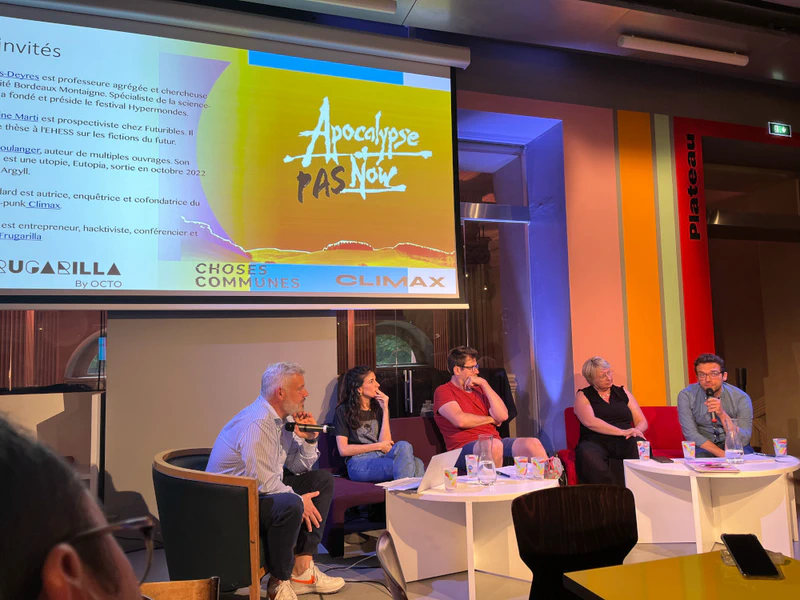There is mitigation and adaptation. Mitigation is about how to reduce the impact of our practices, our ways of living on our existence through challenging planetary balance. But in many people’s minds, this is already a scenario from the past. Adaptation is about how to adapt to the new world that’s coming. How not to get totally screwed by being prepared. In our minds of course, but also by having brought forth plenty of new ways of doing things that will serve us well when the impact hits us (violently and suddenly, or insidiously over the years, I don’t know). But we’re already in the after. And what better way to prepare for the after than to imagine it. Imaginaries and narratives are at the heart of many conversations these days.
Monday, July 4th with Frugarilla and the sparkling Tristan Nitot, surrounded by our two “partners” Climax and Choses communes, a fascinating debate took place on utopian imaginaries (mostly) / dystopias (a bit). Why is it more difficult to write a utopia than a dystopia for example? Some answers discussed: a post-apocalyptic dystopia with fifteen survivors is easier to describe than imagining the management of a positive civilization of two million, fewer cliffhangers that we’re so fond of, etc. We talked about Solar Punk, Malevil by Robert Merle, and lots of things I love. I wondered about the value of role-playing games (you know, Dungeons & Dragons, Cthulhu, Cyberpunk, etc.) in this reflection, because there’s a lot of talk about literature, but we dismiss this form of imaginary too quickly, because it’s not very present here compared to the US for example.
Friend Tristan meticulously collected the works that were cited in his article, as well as the list of speakers.

Everything is narration, everything is story. We knew that. But it’s been on everyone’s lips for some time now. On this subject, I found myself shortly after at SICT 23, a doctoral school on climate issues in relation to digital technology. The subject was the same during my visit: imaginaries (but I only attended one day of the conference) (I also saw things about art and its relationship to sustainable digital technology). Here are the slides I had prepared to present Frugarilla, and talk a bit about imaginaries during the roundtable on this subject. These slides only represent my own views.
» SICT 2023 slides day 1: click to access the PDF
slide 2
The collective, in order, Dominique Buinier the connector, Alexis Nicolas and Sara Boucherot, the experts, myself the entrepreneur, Tristan Nitot the influencer, and grumpy cat to balance the page.
slide 3
Frugarilla, a small group of 5 in a large structure, itself in a very large structure. Our positioning within it on a certain radicalism (essential digital 2030).
slide 4
OCTO’s purpose
slide 5
Our actions, mainly influence.
slides 6 to 9
An influence approach based on reminding about risks. Kotter and all that… Very likely inspired in part by our conversations with Gauthier Roussilhe.
slide 10
Our own internal contradictions
» SICT 2023 slides day 2: click to access the PDF
slide 2
A reminder of ADEME’s scenarios that serve as conversation tools for us: https://www.ademe.fr/en/futures-in-transition/scenarios/ (in English, because quite a few English doctoral students, but you’ll easily find the French version). Frugarilla’s positioning is clearly indicated.
slide 3
The forms of frugal that we defend.
slide 4
Imaginaries are useful for projecting ourselves, for realizing. But we don’t believe in solutions that are already all tied up for today. Like this slide about the war in Afghanistan, the system is too complex. We need to work by principles, by patterns, by emergence.
slide 5
To the researchers who ask us what to research: let’s build a set of components that will allow us to bring forth solutions, let’s not directly seek the solution.
Thank you!